高二英语译林版选修8教案:Unit1Thewrittenword-Grammar含解析
- 格式:docx
- 大小:18.45 KB
- 文档页数:12
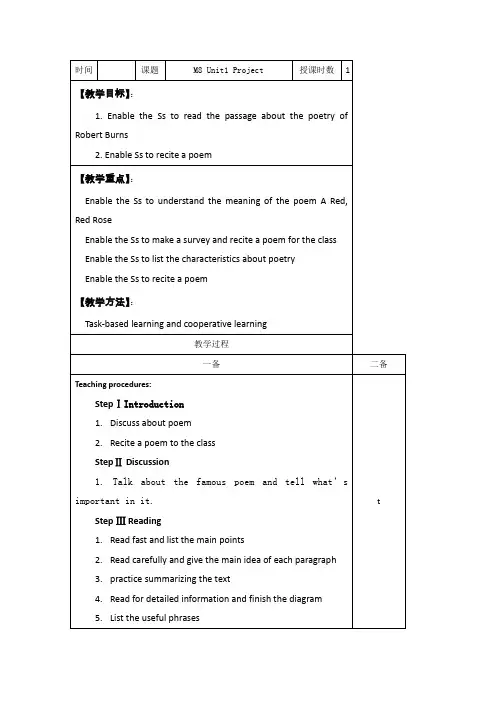
时间课题M8 Unit1 Project 授课时数 1【教学目标】:1. Enable the Ss to read the passage about the poetry of Robert Burns2. Enable Ss to recite a poem【教学重点】:Enable the Ss to understand the meaning of the poem A Red,Red RoseEnable the Ss to make a survey and recite a poem for the classEnable the Ss to list the characteristics about poetryEnable the Ss to recite a poem【教学方法】:Task-based learning and cooperative learning教学过程一备二备Teaching procedures:StepⅠIntroduction1.Discuss about poem2.Recite a poem to the classStepⅡ Discussion1. Talk about the famous poem and tell what’s important in it.t Step Ⅲ Reading1.Read fast and list the main points2.Read carefully and give the main idea of each paragraph3.practice summarizing the text4.Read for detailed information and finish the diagram5.List the useful phrasesStep Ⅳ Project1.Introduce the project.2.Plan to work in groups and give clear assignment3.Decide the class and grade of each group4.prepare for the tasks for each group5. Interview the classmates6.Analyze the questions and answer themStep V Homework1. Do Part A, B on poetry in Workbook.2.Review words and phrases in this unit.教学反思:。
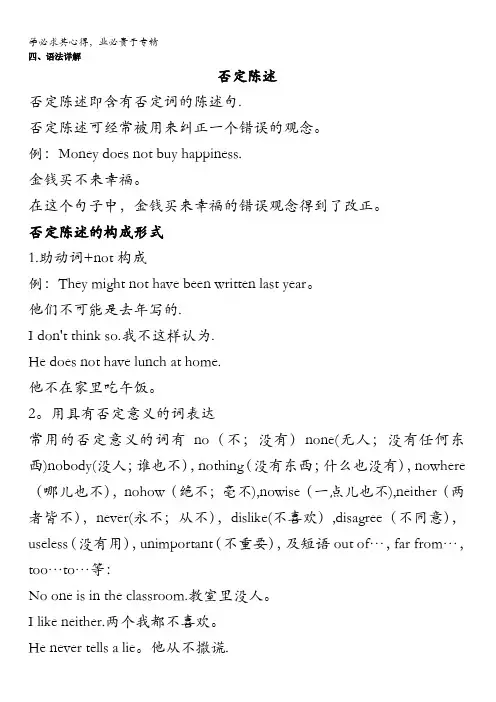
四、语法详解否定陈述否定陈述即含有否定词的陈述句.否定陈述可经常被用来纠正一个错误的观念。
例:Money does not buy happiness.金钱买不来幸福。
在这个句子中,金钱买来幸福的错误观念得到了改正。
否定陈述的构成形式1.助动词+not构成例:They might not have been written last year。
他们不可能是去年写的.I don't think so.我不这样认为.He does not have lunch at home.他不在家里吃午饭。
2。
用具有否定意义的词表达常用的否定意义的词有no(不;没有)none(无人;没有任何东西)nobody(没人;谁也不),nothing(没有东西;什么也没有),nowhere (哪儿也不),nohow(绝不;毫不),nowise(一点儿也不),neither(两者皆不),never(永不;从不),dislike(不喜欢),disagree(不同意),useless(没有用),unimportant(不重要),及短语out of…,far from…,too…to…等:No one is in the classroom.教室里没人。
I like neither.两个我都不喜欢。
He never tells a lie。
他从不撒谎.The book is useless。
这本书没有用。
She dislikes him.她不喜欢他。
The machine is out of work.这台机器不能工作了。
He is too young to go to school.她太小,还不能上学。
注意:有时not与带有否定前缀的形容词连用,可表示一种肯定意义。
例:It’s not uncommon to find her reading the newspaper。
发现她在读报纸是常见的事。
3.有些总括性代词、形容词或副词等和not连用时,表示半否定(也称部分否定);这类总括词有all(一切;全体),both(二者;两),each 或every(每个;人人),everyone(每个人;人人),everything(每件事;每件东西),everywhere(每个地方;各地),always(总是),altogether(全体),wholly(全部)等:Both are not correct。
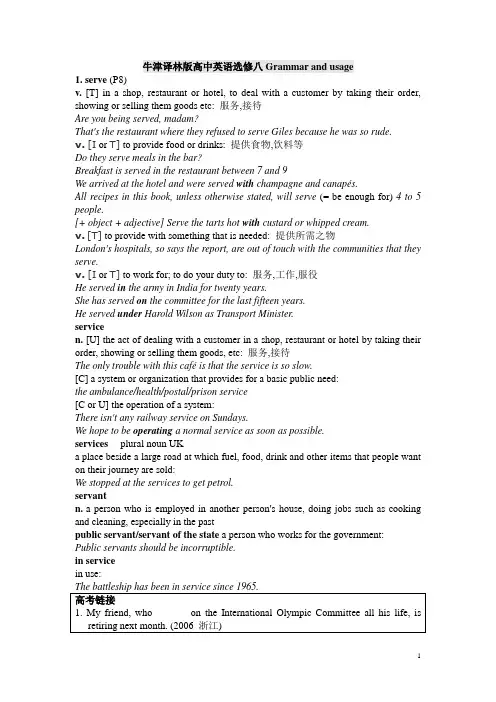
牛津译林版高中英语选修八Grammar and usage1. serve (P8)v. [T] in a shop, restaurant or hotel, to deal with a customer by taking their order, showing or selling them goods etc: 服务,接待Are you being served, madam?That's the restaurant where they refused to serve Giles because he was so rude.v.[I or T] to provide food or drinks: 提供食物,饮料等Do they serve meals in the bar?Breakfast is served in the restaurant between 7 and 9We arrived at the hotel and were served with champagne and canapés.All recipes in this book, unless otherwise stated, will serve (= be enough for) 4 to 5 people.[+ object + adjective] Serve the tarts hot with custard or whipped cream.v.[T] to provide with something that is needed: 提供所需之物London's hospitals, so says the report, are out of touch with the communities that they serve.v.[I or T] to work for; to do your duty to: 服务,工作,服役He served in the army in India for twenty years.She has served on the committee for the last fifteen years.He served under Harold Wilson as Transport Minister.servicen. [U] the act of dealing with a customer in a shop, restaurant or hotel by taking their order, showing or selling them goods, etc: 服务,接待The only trouble with this café is that the service is so slow.[C] a system or organization that provides for a basic public need:the ambulance/health/postal/prison service[C or U] the operation of a system:There isn't any railway service on Sundays.We hope to be operating a normal service as soon as possible.services plural noun UKa place beside a large road at which fuel, food, drink and other items that people want on their journey are sold:We stopped at the services to get petrol.servantn.a person who is employed in another person's house, doing jobs such as cooking and cleaning, especially in the pastpublic servant/servant of the state a person who works for the government:Public servants should be incorruptible.in servicein use:v. [T]1)to take care of a person, or an animal or plant, until they are completely grown: 抚养Her parents died when she was a baby and she was raised by her grandparents.The lambs had to be raised by hand (= fed artificial milk by people)when their mother died.The farmer raises (= breeds) chickens and pigs.The soil around here isn't good enough for raising (= growing) crops.2) to cause sth. to increase or become bigger, better, higher, etc: 抬高, 提高The government plan to raise taxes.I had to raise my voice (= speak more loudly) to make myself heard over the noise. The inspector said that standards at the school had to be raised.Our little chat has raised my spirits (= made me feel happier).3) to lift sth. to a higher position: 举起Would all those in favor please raise their hands?He raised the window and leaned out.Mary Quant was the first fashion designer to raise hemlines.3. abuse (9)v. [T] 1) to use or treat someone or sth. wrongly or badly, especially in a way that is to your own advantage: 虐待She is continually abusing her position/authority by getting other people to do things for her.I never expected that he would abuse the trust I placed in him.Several of the children had been sexually/physically/emotionally abused.2) to speak to someone rudely or cruelly: 辱骂The crowd started abusing him after he failed to save a goal.n. [U] rude and offensive words said to another person: 辱骂He had apparently experienced a lot of verbal abuse from his co-workers.He hurled (a stream/torrent of) abuse at her (= He said a lot of rude and offensive things to her).'Idiot!' is a mild term of abuse (= an insulting expression).child abusen. [U] when adults intentionally treat children in a cruel or violent way: 虐待儿童4. get caught (P9)v. [L + past participle] (getting, got, got or US gotten) sometimes used instead of 'be' to form the passive:I got shout ed at by some idiot for walking past his house.They're getting marri ed later this year.pressv. [I or T; usually + adv. or prep.] to push sth. firmly, often without causing it to move permanently further away from you: 按,压Press the button to start the machine.He pressed his face against the window.Can you press a bit harder on my shoulders, please?The crowd pressed against the locked doors trying to get into the building.Press down firmly on the lever.[T] to make clothes smooth by ironing them: 熨烫I'll just press these trousers.[T] to put a weight on fruit in order to remove the juice: 榨汁to press grapes[T] to make a record or CD: 制唱片Over 3000 copies of the CD were pressed and sent some out to college radio stations. [T] to make sth. flat and firm by putting it under sth. heavy: 压扁The children pressed some flowers.pressed turkey breastn. [C usually singular] a firm push against sth. using the fingers: 按,压To start the machine, just give this button a press.[S] when you make cloth smooth with an iron: 熨烫Can you give this shirt a quick press?[C] a piece of equipment which is used to put weight on something in order to crush it, remove liquid from it or to make it flat: 熨斗a garlic/trouser/wine pressto try hard to persuade someone to do something: 强迫,迫使[+ object + to infinitive] The committee pressed him to reveal more information.He's pressing me for an answer.Can I press you further on(= persuade you to say more about) this issue?pressuren. [U] the force you produce when you press sth.: 压力He put too much pressure on the door handle and it snapped.You can stop bleeding by applying pressure close to the injured area.[C or U] the force that a liquid or gas produces when it presses against an area:gas/water pressureThe new material allows the company to make gas pipes which withstand higher pressures.The gas is stored under pressure (= in a container which keeps it at a higher pressure than it would usually have).[U] when someone tries to make someone else do sth. by arguing, persuading, etc: 压力(抽象)public/political pressureTeachers are under increasing pressure to work longer hours.[+ to infinitive] Pressure to abandon the new motorway is increasing.The government is facing pressure from environmental campaigners.He only asked her under pressure from his wife (= because his wife forced him to). She's putting pressure on him (= trying to persuade him) to get married.FORMAL The international community are trying to bring pressure to bear on the government (= trying to persuade them) to resolve the situation.[C or U] a difficult situation that makes you feel worried or unhappy:She's got a lot of pressure on her at work just now.Be nice to him - he's been under a lot of pressure recently.Can you work well under pressure?n.[C] a suggestion that sth. unpleasant or violent will happen, especially if a particular action or order is not followed: 威胁[+ to infinitive] She carried out her threat to throw away any clothes that were left on the floor.The threat of jail failed to deter him from petty crime.Drunken drivers pose a serious threat (= cause a lot of harm) to other road users.He says he'll tell the authorities but it's just an empty threat (= it will not happen).be under threat of sth.to be in a situation where people are threatening you with sth. bad or unpleasant: 在……的威胁之下She left the country under threat of arrest if she returned.threatenv. [T] to tell someone that you will kill or hurt them, or cause problems for them if they do not do what you want: 威胁They threatened the shopkeeper with a gun.[+ to infinitive] They threatened to kill him unless he did as they asked.[I] If sth. bad threatens to happen, it is likely to happen: 预兆,征兆Look at those clouds! There's a storm threatening.[T] to be likely to cause harm or damage to sth. or someone: 对……造成威胁v. [I or T] to fight against sth. or someone that is attacking you: 抗拒……的诱惑The soldiers resisted (the enemy attacks) for two days.[T] to refuse to accept or be changed by sth.: 拒绝The party leader resisted demands for his resignation.He tried to run away from the police and was charged with resisting arrest.The new hybrid crops are much better at resisting disease.[T] to stop yourself from doing sth. that you want to do: 克制自己去做某事I can never resist temptation/chocolate/the urge to laugh.[+ ing form of verb] She couldn't resist laughing at him in those clothes.resistancen. [U] when sth. or someone resists:resistance to diseaseGovernment troops offered no resistance (to the rebels).There's a lot of resistance (= opposition) to the idea of a united Europe.[U] a force which acts to stop the progress of sth. or make it slower:The car's speed was reduced by air/wind resistance.[C or U] SPECIALIZED the degree to which a substance prevents the flow of an electric current through it:Copper has (a) low resistance.resistantadj. 1) not wanting to accept sth., especially changes or new ideas:Why are you so resistant to change?2) not harmed or affected by sth.:a stain-resistant carpeta disease-resistant variety of tomato。
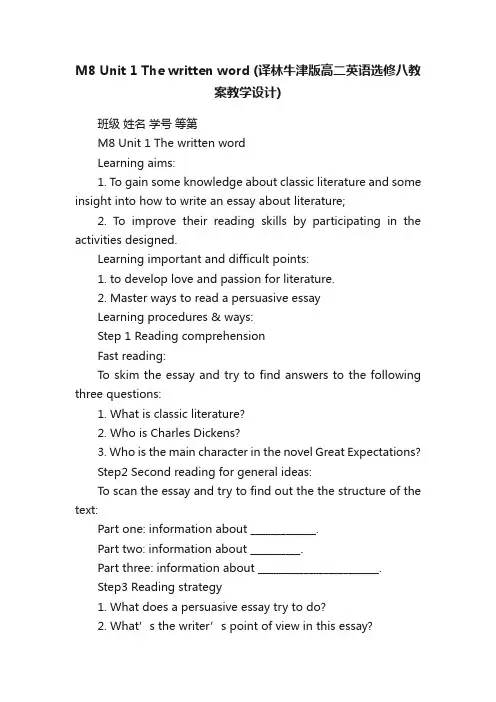
M8 Unit 1 The written word (译林牛津版高二英语选修八教案教学设计)班级姓名学号等第M8 Unit 1 The written wordLearning aims:1. To gain some knowledge about classic literature and some insight into how to write an essay about literature;2. To improve their reading skills by participating in the activities designed.Learning important and difficult points:1. to develop love and passion for literature.2. Master ways to read a persuasive essayLearning procedures & ways:Step 1 Reading comprehensionFast reading:To skim the essay and try to find answers to the following three questions:1. What is classic literature?2. Who is Charles Dickens?3. Who is the main character in the novel Great Expectations?Step2 Second reading for general ideas:To scan the essay and try to find out the the structure of the text:Part one: information about _____________.Part two: information about __________.Part three: information about ________________________.Step3 Reading strategy1. What does a persuasive essay try to do?2. What’s the writer’s point of view in this essay?3. How does the author try to convince the reader?Step 4 Further comprehension of each part:Part one: Questions:1. Why don’t many people read the classics?2. What does Liz think about classic novels?Multiple choice exercise1. The writer wrote the passage mainly to __.A. convince us to change our attitude(态度) to classicsB. introduce Charles Dicken’s novels to usC. suggest that we should read more classicsD. make a summary of Great Expectations2. Some people think that classics are old-fashioned because of the following statements except __________.A. they were written a long time ago.B. the language used in them is quite different from the language used today.C. they are difficult for people to understand.D. They can only be found in bookshops and libraries.3. Which of the following is Not true according to the text?A. Classics are also worth reading today.B. We can find the value of writing and wisdom in classics.C. Classics have nothing to do with life today.D. Some classics have been adapted for movies.Part two: Questions:1. When and where was Charles Dickens born?2. What books did he write?3. What is written on his gravestone (tomb)?Part three: Questions:1. What are the main elements of a novel? Read part three and match the elements on the left with the correct examples onthe right.The main elements of the novel :1. setting a. mist2. symbol b. what it means to be a gentleman3. plot c. England in the early 1800s4. theme d. Pip, Joe, Estella5. characters e. a stranger gives Pip a lot f money, then Pip moves toLondon and becomes a snob2.What does Pip learn by the end of the novel?3.What’re the main elements(要素) to consider when reading a novel?4.What makes a good persuasive essay?Step 5 Post-reading activities:Consolidation: Match them with correct definitions.1. antiques a. very quick and not expected2. well received b. insisting on doing something3. released c. valuable things from the past4. abrupt d. liked by a lot of people5. prejudice e. made available to the public6. rigid f .difficult to change7. civil g. preference that prevents true consideration of a situation8. bent on h.. polite, good-mannered9. shabby i . not plain or simple; expensive10. fancy j . old and in bad conditionFill in the blanks with the following words.shallow husband fortune symbol gentleman Pip novel authors theme EnglandGreat Expectations is my favorite book. It was written by oneof England’s greatest __1._____,Charles Dickens, and is now seen as classic literature. The main character in the novel is _2_______, a poor boy from England. He lives with his mean sister and her ___3____, Joe.The story is set in ___4____ in the early 1800s. It is a misty night when the story begins. Mist is a _____5_ for danger and uncertainty used throughout the __6_____.Later in the story, Pip receives a large sum of money from a stranger. He uses the _7____ to move to London without any companions. He settles there so he can become an educated ___8______. Pip changes from a pleasant young man into a very ____9_____ one. What it means to be a gentleman is an important ___10____ in Great Expectations. Pip is not really a gentleman because he is prejudiced against Joe.随堂检测:Choose the best answers according the text:1. Which of the following novels is NOT a classic?A. Great ExpectationsB. Gone with the WindC. EmmaD. Harry Potter and the Deathly Hallows2. Joe in Great Expectations can be described as ___________.A. simple but kind-heartedB. civil but shallowC. poor and unfortunateD. shabby and prejudiced3.The theme Charles Dickens wanted to express in Great Expectations is that _________.A. wisdom comes by sufferingB. poverty and hardships lead to a strong manC. there’s no such thing as a free lunchD. happiness and friendship outweigh wealth and educationRead the passage and fill in the table with the given information below.(no more three words in each blank)Title: Appreciating literatureClassics Definition Antiques of 1._________Features *Well written and well received*Full of 2._______Problems They are usually 3.________to understand and some people think they are 4.___________.Popularity They still 5.__________Chares Dickens Birth In Portsmouth ,England in 1812Death 6._________________Great Expectations Achievements *He published many novels, some of which were later7.__________For movies and plays.*He is regarded as England’s greatest writer8.________ In England in the early 1800s9.__________ What it really means to be a gentlemanSymbol 10.__________The twist in the plot A fortune from11.____________ sets Pip, the main character, free financial worries.Ending Pip realizes that 12._________is more important than wealth.This change in Pip is called 13.___________.M8 Unit 1 The written wordLearning aims:1. To gain some knowledge about classic literature and some insight into how to write an essay about literature;2. To improve their reading skills by participating in the activities designed.Learning important and difficult points:1. to develop love and passion for literature.2. Master ways to read a persuasive essayLearning procedures & ways:Step 1 Reading comprehensionFast reading:To skim the essay and try to find answers to the following three questions:1. What is classic literature?2. Who is Charles Dickens?3. Who is the main character in the novel Great Expectations?Answers:1. Classics are the antiques of the literary world including novels, plays and poems that were written a long time ago and were well written and received.2. Dickens is England’s greatest writer.3. Pip is the main character in the novel Great Expectations.Step2 Second reading for general ideas:To scan the essay and try to find out the the structure of the text:Part one: information about _____________.Part two: information about __________.Part three: information about ________________________.Key: classic literature; Charles Dickens; the book Great expectationsStep3 Reading strategy1. What does a persuasive essay try to do?2. What’s the writer’s point of view in this essay?3. How does the author try to convince the reader?Answers: 1. To convince the reader to adopt a certain point of view.2. To persuade us to appreciate classic literature.3. At the very beginning the writer asks us to reconsider our ideas about classic literature. Then she gives us interesting factsabout Charles Dickens and his book, Great Expectation, which makes us want to read the book at the end of the essay.Step 4 Further comprehension of each part:Part one: Questions:1. Why don’t many people read the classics?2. What does Liz think about classic novels?Multiple choice exercise1. The writer wrote the passage mainly to __.A. convince us to change our attitude(态度) to classicsB. introduce Charles Dicken’s novels to usC. suggest that we should read more classicsD. make a summary of Great Expectations2. Some people think that classics are old-fashioned because of the following statements except __________.A. they were written a long time ago.B. the language used in them is quite different from the language used today.C. they are difficult for people to understand.D. They can only be found in bookshops and libraries.3. Which of the following is Not true according to the text?A. Classics are also worth reading today.B. We can find the value of writing and wisdom in classics.C. Classics have nothing to do with life today.D. Some classics have been adapted for movies.Keys: ADCPart two: Questions:1. When and where was Charles Dickens born?2. What books did he write?3. What is written on his gravestone (tomb)?Answers: 1.He was born in Portsmouth, England in 1812.2. Works by Charles DickensGreat Expectations《远大前程》《Oliver Twist》《双城记》《A Christmas Carol》《圣诞颂歌》《Hard Times》《艰难时世》《A Tale of Two Cities》《双城记》《David Copperfield》《大卫科波菲尔》3.On his gravestone it reads, “By his death, one of England’s greatest writers is lost to the world.”Part three: Questions:2. What are the main elements of a novel? Read part three and match the elements on the left with the correct examples on the right.The main elements of the novel1. setting a. mist2. symbol b. what it means to be a gentleman3. plot c. England in the early 1800s4. theme d. Pip, Joe, Estella5. characters e. a stranger gives Pip a lot f money, then Pip moves toLondon and becomes a snob2.What does Pip learn by the end of the novel?3.What’re the main elements(要素) to consider when reading a novel?4.What makes a good persuasive essay?Answers:1.c a e b d2.He learns that wealth does not buy happiness and that friends are more important than a fancy education.(This is an example of character development in Great Expectations, that is, it is the change in Pip from being concernedonly with money to seeing that money is not the most important thing in life.)3.characters, setting, symbol, theme and plot4.It gives enough information to make readers interested but not enough to give away the story.Step 5 Post-reading activities:Discussion:Can you think of some possible endings for the novel?Consolidation: Match them with correct definitions.8. antiques a. very quick and not expected9. well received b. insisting on doing something10. released c. valuable things from the past11. abrupt d. liked by a lot of people12. prejudice e. made available to the public13. rigid f .difficult to change14. civil g. preference that prevents true consideration of a situation8. bent on h.. polite, good-mannered9. shabby i . not plain or simple; expensive10. fancy j . old and in bad conditionKeys: c d e a g f h b j iFill in the blanks with the following words.shallow husband fortune symbol gentleman Pip novel authors theme Englandshallow husband fortune symbol gentleman Pip novel authors theme EnglandGreat Expectations is my favorite book. It was written by one of England’s greatest __1._____,Charles Dickens, and is now seen as classic literature. The main character in the novel is_2_______, a poor boy from England. He lives with his mean sister and her ___3____, Joe.The story is set in ___4____ in the early 1800s. It is misty night when the story begins. Mist is a _____5_ for danger and uncertainty used throughout the __6_____.Later in the story, Pip receives a large sum of money from a stranger. He uses the _7____ to move to London withoutany companions. He settles there so he can become an educated ___8______. Pip changes from a pleasant young man into a very ____9_____ one. What it means to be a gentleman is an important ___10____ in Great Expectations.Pip is not really a gentleman because he is prejudicedagainst Joe.Keys.authors Pip husband England symbol novel fortune gentleman shallow theme随堂检测:Choose the best answers according the text:1. Which of the following novels is NOT a classic?A. Great ExpectationsB. Gone with the WindC. EmmaD. Harry Potter and the Deathly Hallows2. Joe in Great Expectations can be described as ___________.A. simple but kind-heartedB. civil but shallowC. poor and unfortunateD. shabby and prejudiced3.The theme Charles Dickens wanted to express in Great Expectations is that _________.A. wisdom comes by sufferingB. poverty and hardships lead to a strong manC. there’s no such thing as a free lunchD. happiness and friendship outweigh wealth and educationKeys: DADRead the passage and fill in the table with the given information below.(no more three words in each blank) Title: Appreciating literatureClassics Definition Antiques of 1._________Features *Well written and well received*Full of 2._______Problems They are usually 3.________to understand and some people think they are 4.___________.Popularity They still 5.__________Chares Dickens Birth In Portsmouth ,England in 1812Death 6._________________Great Expectations Achievements *He published many novels, some of which were later7.__________For movies and plays.*He is regarded as England’s greatest writer8.________ In England in the early 1800s9.__________ What it really means to be a gentlemanSymbol 10.__________The twist in the plot A fortune from11.____________ sets Pip, the main character, free financial worries.Ending Pip realizes that 12._________is more important than wealth.This change in Pip is called 13.___________.Keys:1. the literary world 2. wisdom 3. difficult 4. old-fashioned and boring 5. have a place 6. In 1870 7. adapted 8. Setting 9. Theme 10. Mist 11. a generous stranger 12. friendship 13. character development~。
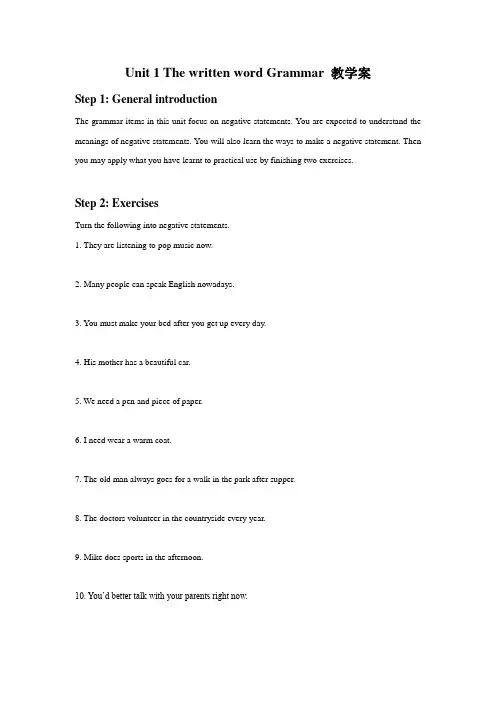
Unit 1 The written word Grammar 教学案Step 1: General introductionThe grammar items in this unit focus on negative statements. You are expected to understand the meanings of negative statements. You will also learn the ways to make a negative statement. Then you may apply what you have learnt to practical use by finishing two exercises.Step 2: ExercisesTurn the following into negative statements.1. They are listening to pop music now.________________________________2. Many people can speak English nowadays._________________________________3. You must make your bed after you get up every day._______________________________________________4. His mother has a beautiful car.________________________________________________5. We need a pen and piece of paper.________________________________________________6. I need wear a warm coat._________________________________________________7. The old man always goes for a walk in the park after supper._______________________________________________8. The doctors volunteer in the countryside every year._________________________________________9. Mike does sports in the afternoon.________________________________10. You’d better talk with your parents right now.___________________________________Step 3: Explanation and practice1. Make a list of the most commonly used negative words:no,not,never,neither,hardly,seldom,few,little,barely…2. Please decide whether it is a true statement: John Keats was a famous short story writer.This statement is untrue. We can correct an untrue statement in the following way:John Keats was not a famous short story writer.3. As we learned,negative statements are often used to correct a mistaken idea. Let’s recall the ways to make negative statements.4. Read Part 1 and Part 2. When not is used with a negative prefix,the meaning of the sentence is positive. However,the positive meaning is not as strong as that of a direct positive statement. For example:Students are not discouraged to discuss things with their classmates. (Students are encouraged to discuss things with their classmates.)Your actions were not inexcusable,but they were certainly not appropriate. (Your actions were excusable,but certainly not appropriate.)It is not uncommon for him to be late. (It is very common for him to be late.)not can be used before a phrase of time,distance or a noun phrase to emphasize the negative。
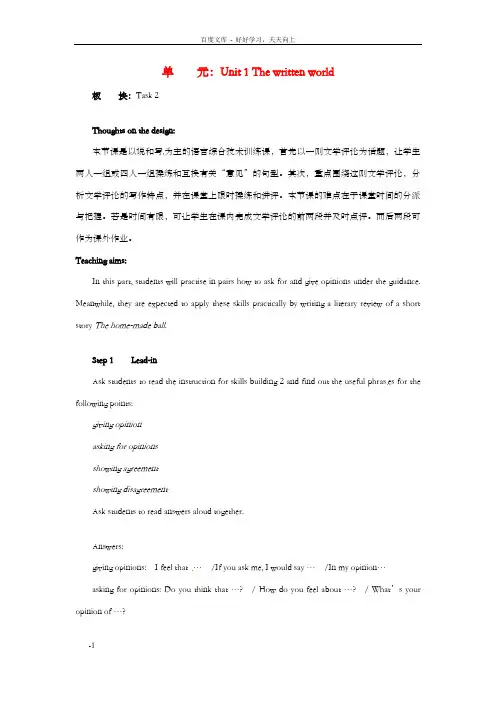
单元:Unit 1 The written world板块:Task 2Thoughts on the design:本节课是以说和写为主的语言综合技术训练课,首先以一则文学评论为话题,让学生两人一组或四人一组操练和互换有关“意见”的句型。
其次,重点围绕这则文学评论,分析文学评论的写作特点,并在课堂上限时操练和讲评。
本节课的难点在于课堂时间的分派与把握。
若是时间有限,可让学生在课内完成文学评论的前两段并及时点评。
而后两段可作为课外作业。
Teaching aims:In this part, students will practise in pairs how to ask for and give opinions under the guidance. Meanwhile, they are expected to apply these skills practically by writing a literary review of a short story The home-made ball.Step 1 Lead-inAsk students to read the instruction for skills building 2 and find out the useful phras es for the following points:giving opinionasking for opinionsshowing agreementshowing disagreementAsk students to read answers aloud together.Answers:giving opinions: I feel that …/If you ask me, I would say …/In my opinion…asking for opinions: Do you think that …?/ How do you feel about …?/ What’s your opinion of …?showing agreement: Exactly! /I think so, too. /I feel the same way.showing disagreement: I disagree. /I beg to differ. /I don’t feel the same way.[Explanation]本节课的导入,以阅读讲义上有关如何询问及给予意见的说明材料着手。
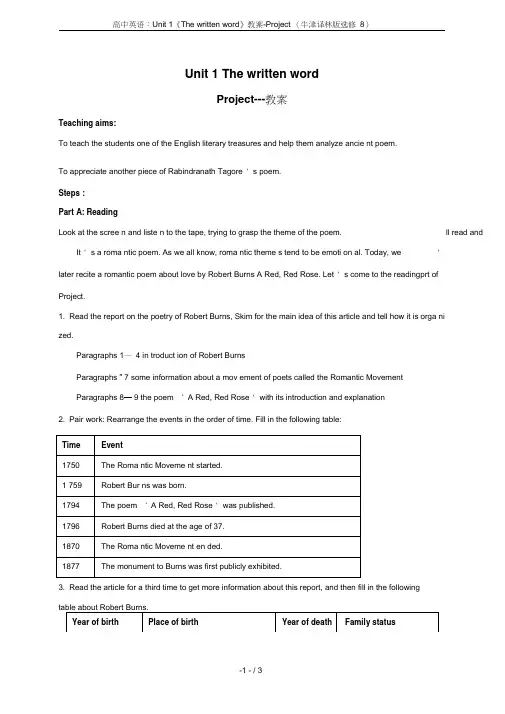
Unit 1 The written wordProject---教案Teaching aims:To teach the students one of the English literary treasures and help them analyze ancie nt poem.To appreciate another piece of Rabindranath Tagore ' s poem.Steps :Part A: ReadingLook at the scree n and liste n to the tape, trying to grasp the theme of the poem.It ' s a roma ntic poem. As we all know, roma ntic theme s tend to be emoti on al. Today, we ' later recite a romantic poem about love by Robert Burns A Red, Red Rose. Let ' s come to the readingprt of Project.1. Read the report on the poetry of Robert Burns, Skim for the main idea of this article and tell how it is orga ni zed.Paragraphs 1— 4 in troduct ion of Robert BurnsParagraphs ” 7 some information about a mov ement of poets called the Romantic MovementParagraphs 8— 9 the poem ‘ A Red, Red Rose ' with its introduction and explanation2. Pair work: Rearrange the events in the order of time. Fill in the following table:3. Read the article for a third time to get more information about this report, and then fill in the following ll read and4. Read and recite the poem A Red, Red Rose,trying to u nderstand the meaning of the poem.5. poem appreciation: by Rabindranath TagoreThe Furthest Distance in the worldThe furthest dis tance in the worldIs not betwee n life and deathBut whe n I sta nd in front of youYet you don't know thatI love you.The furthest dista nee in the worldIs not when I stand in front of youYet you can\'t see my loveBut whe n un doubtly knowing the love from bothYet cannot be together.The furthest dista nee in the worldIs not being apart while being in loveBut whe n I pla inly cannot resist the year ningYet prete nding you have n ever bee n in my heart.The furthest dista nee in the worldIs not struggli ng aga inst the tidesBut using on e\'s in differe nt heartTo dig an un crossable riverFor the one who loves you .Part B1. Group work: Discuss the eight questi ons in Part B. Then prepare your project.2. Present your project.Homework1. Read the passage in project and recite the poem.2. Do Parts B1 and B2 on page 101 of the Workbook.。
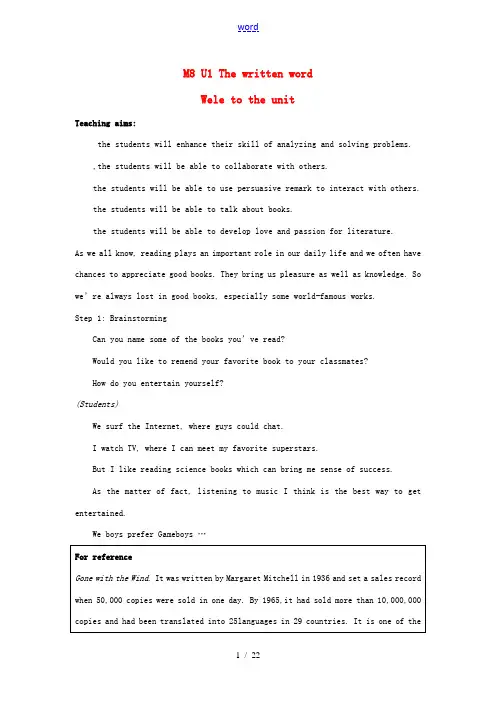
M8 U1 The written wordWele to the unitTeaching aims:the students will enhance their skill of analyzing and solving problems.,the students will be able to collaborate with others.the students will be able to use persuasive remark to interact with others.the students will be able to talk about books.the students will be able to develop love and passion for literature.As we all know, reading plays an important role in our daily life and we often have chances to appreciate good books. They bring us pleasure as well as knowledge. So we’re always lost in good books, especially some world-famous works.Step 1: BrainstormingCan you name some of the books you’ve read?Would you like to remend your favorite book to your classmates?How do you entertain yourself?(Students)We surf the Internet, where guys could chat.I watch TV, where I can meet my favorite superstars.But I like reading science books which can bring me sense of success.As the matter of fact, listening to music I think is the best way to get entertained.We boys prefer Gameboys …Step 2: Sharing informationGroup work: Look at the four pictures at page 1. Le t’s study them one by one and try to discuss. The following questions might help you.(1) to find out why people write poems(2) to tell the differences between science fiction books and poetry (Teacher)I expect that we all take notes of what advice-providers are talking about. (Students)(1) People want to express what their feelings are. Or they believe poetry is beautiful, which could be appreciated by others.(2) In my opinion, there are many differences between poetry and science fiction. To begin with, poetry uses much more conciselanguage and specialwriting techniques like rhythm and rhyme. Next, poets often express their thoughts and feelings in poems, while science fiction writers often tell what may be possible in the future based on developments in science. Lastly, poems usually reflect life or society at specific times, while the main topics of science fiction books range from scientific discoveries, space travel, life on other planets to environmental changes.Step3: Discussion1.Do you think that e-books will replace books in print?2.What are some of the differences between poetry and science fiction books?As we could see, a lot of people enjoy reading books, which is why my friend Jack decided to work for a library. Therefore the book is at least as important as other media for entertaining, which can not be neglected. So when you are watching TV or chatting online, don’t forget we still have books to read, which could also entertain people.Step4: Homework1. Collect more information about literature.2. Prepare the Reading part.Reading Appreciating literatureTeaching aims:1. Students are expected to gain some knowledge about classic literature and someinsight into how to write an essay about literature;2. Students are expected to improve their reading skills by participating in the activities designed.Step1: Lead-inLet’s enjoy a section of film. Is it wonderful? Do you know something about the film?It’s based on Dickens’s famous novel“Oliver Twist”.It’s an example of classics. Cl assics are the antiques of the literary world. In this unit, we’ll have the chance to get more information about classic literature.Step 2: Fast reading for general ideasGo through the passage as quickly as possible and try to find answers to the three questions in part A on Page 2. Just focus on and identify the information needed to answer these questions.Reading strategy:1.What does a persuasive essay try to do?2. What’s the writer’s point of view in this essay?3. How does the author try to convince the reader?Key: 1. To convince the reader to adopt a certain point of view.2. To persuade us to appreciate classic literature.3. At the start, she asks us to change our minds about classic literature.Then she gives us interesting facts about Charles Dickens and his book,Great Expectations, which makes us want to read the book at the end of theessay.Step 3: Detailed reading for important information1.Let’s read the passage a second time and plete Parts C1 and C2 on page 4. Part one: Questions:1. Why don’t many people read t he classics?2. What does Liz think about classic novels?Multiple choice exercise (PPT18—20)Part two: Questions:1. When and where was Charles Dickens born?2. What books did he write?3. What is written on his gravestone (tomb)?Present brief introduction to Dickens and works by Charles Dickens.Part three: Questions:1. What are the main elements of a novel?2. What does Pip learn by the end of the novel?3. What’re the main elements(要素) to consider when reading a novel?4. What makes a good persuasive essay?Grammar and Usage否定表达英语否定概念的表达形式大致可以分为两大类——显形否定和隐形否定。
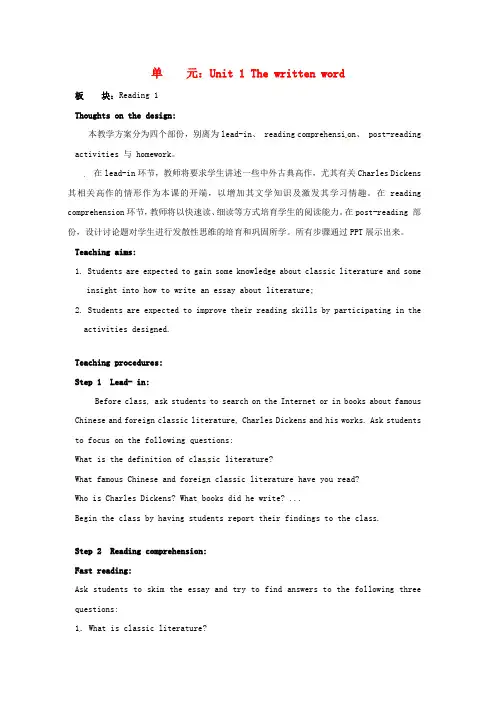
单元:Unit 1 The written word板块:Reading 1Thoughts on the design:本教学方案分为四个部份,别离为lead-in、 reading comprehensi on、 post-reading activities 与 homework。
在lead-in环节,教师将要求学生讲述一些中外古典高作,尤其有关Charles Dickens 其相关高作的情形作为本课的开端,以增加其文学知识及激发其学习情趣。
在reading comprehension环节,教师将以快速读、细读等方式培育学生的阅读能力。
在post-reading 部份,设计讨论题对学生进行发散性思维的培育和巩固所学。
所有步骤通过PPT展示出来。
Teaching aims:1. Students are expected to gain some knowledge about classic literature and someinsight into how to write an essay about literature;2. Students are expected to improve their reading skills by participating in theactivities designed.Teaching procedures:Step 1 Lead- in:Before class, ask students to search on the Internet or in books about famous Chinese and foreign classic literature, Charles Dickens and his works. Ask students to focus on the followi ng questions:What is the definition of clas sic literature?What famous Chinese and foreign classic literature have you read?Who is Charles Dickens? What books did he write? ...Begin the class by having students report their findings to the class.Step 2 Reading comprehension:Fast reading:Ask students to skim the essay and try to find answers to the following three questions:1. What is classic literature?2. Who is Charles Dickens?3. Who is the main character in the novel Great Expectations?Answers:1. Classics are the antiques o f the literary world including no vels, plays andpoems that were written a long time ago and were so well written that people still read them today.2. Dickens is England’s g reatest writer.3. Pip is the main character in the novel Great Expectations.Step 3 Second reading for general ideas:Ask students to scan the essay and try to find out the structure of the text: Part one: information about _____________.Part two: information about __________.Part three: information about ________________________.Key: classic literature; Charles Dickens; the book Great expectationsStep 4 Reading strategy:1. What does a persuasive essay try to do?2. What’s the writer’s point of view in this essay?3. How does the author try to convi nce the reader?Key: 1. To convince the reader to adopt a certain point of view.2. To persuade us to appreciate classic literature.3. At the start, she asks us to change our minds about classic literature.Then she gives us interesting facts about Charles Dickens and his book,Great Expectations, which makes us want to read the book at the end of theessay.Step 5 Listening and further comprehension of each part:Part one: Questions:1. Why don’t many people read the classics?2. What does Liz think about classic novels?Multiple choice exercise (PPT18—20)Part two: Questions:1. When and where was Charles Dickens born?2. What books did he write?3. What is written on his gravestone (tom b)?Present brief introduction to Dickens and works by Charles Dickens.Part three: Questions:1. What are the main elements of a novel?2. What does Pip learn by the end of the novel?3. What’re the main elements (要素) to consider when reading a novel?4. What makes a good persuasive essay?Step 6 Post-reading activities:Discussion:Can you think of some possible endings for the novel?Consolidation1. 2 matching exercises. (PPT 33-34)2.Fill in the blanks with the following words. (PPT35-36)Step 7 Homework:1. R ead the text again and try to retell the story of Great Expectations.2. Think of some possible endings for the novel and write it down.。
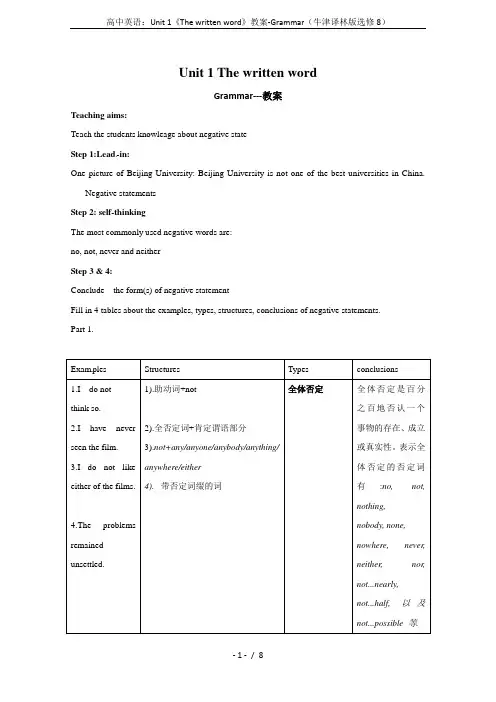
Unit 1 The written wordGrammar---教案Teaching aims:Teach the students knowleage about negative stateStep 1:Lead-in:One picture of Beijing University: Beijing University is not one of the best universities in China. -----Negative statementsStep 2: self-thinkingThe most commonly used negative words are:no, not, never and neitherStep 3 & 4:Conclude the form(s) of negative statementFill in 4 tables about the examples, types, structures, conclusions of negative statements.Part 1.plesPart 2Part 3Part 4Part 54..Unless you read theStep 5Do Part A on page 9Step 6Finish Part B on page 9Step 7. Homework:Do Part C1 andC2 on page 102 of the wo rkbook Further studies一般否定句I don't know this. No news is good news.There is no person /not a person/not any person in the house.2)特指否定He went to his office, not to see him.I am sorry for not coming on time.I don't think/believe/suppose/feel/imagine you are right.3)部分否定I don't know all of them.I can't see everybody/everything.All the answers are not right.(并非所有答案都对。
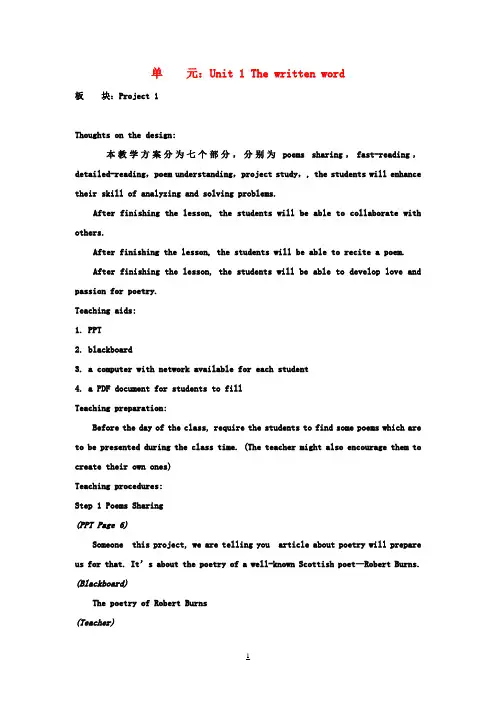
单元:Unit 1 The written word板块:Project 1Thoughts on the design:本教学方案分为七个部分,分别为poems sharing,fast-reading,detailed-reading,poem understanding,project study,, the students will enhance their skill of analyzing and solving problems.After finishing the lesson, the students will be able to collaborate with others.After finishing the lesson, the students will be able to recite a poem.After finishing the lesson, the students will be able to develop love and passion for poetry.Teaching aids:1. PPT2. blackboard3. a computer with network available for each student4. a PDF document for students to fillTeaching preparation:Before the day of the class, require the students to find some poems which are to be presented during the class time. (The teacher might also encourage them to create their own ones)Teaching procedures:Step 1 Poems Sharing(PPT Page 6)Someone this project, we are telling you article about poetry will prepare us for that. It’s about the poetry of a well-known Scottish poet—Robert Burns. (Blackboard)The poetry of Robert Burns(Teacher)So ]Poems sharing环节将发挥学生参与的主观能动性并在此基础上明确本课的学习方向。
Unit 1 The written wordTask ---教案Teaching aims:To develop students’s ablity of listening.To teach them how to write literatury review.Skills building 1: listening for key wordsRead the guidelines in Skills building 1 on Page 10. Try to give a speech, following the guidelines. Step 1: recognizing key words1. Listen to this speech, trying to fill the table in Part A on Page 10.2. Listen to the tape again, and check the answers.3. What role do you think friendship plays in our daily life? Now, let’s r ead a short story. After that,you may get a better understanding of friendship.4. Read the story again and then complete the table with the key words in the short story.5. Listen to the conversation in Part C and check your notes in Part B against what you hear inPart C.Skills building 2: asking for and giving opinions1. Group work: Discussion: How to ask for and give opinions?2. Pair work: Create a situation and make a dialogue, you’ll practice using the phrases you listed just now.3. Read the guidelines on Page 12.Step 2: giving your opinion on a literary review1. Read the literary review of “The Attic” on page 12. Focus on the plot, characters and the theme of the story.2. Have a discussion about the five questions listed below the review. Give your ideas freely.3. Acting: Work in pairs, making a dialogue. One acts as the reporter and the other as the reader. Try to use as many questions as possible.Sample answersReporter: Good morning, Miss Yang. I’ve just read your literary review of ‘The Attic’ in a magazine. Could I ask you a few questions about it?Reader: Sure. What would you like to know about?Reporter: Do you think the plot of ‘The Attic’ sounds interesting?Reader: Yes, it is really entertaining and poetic from beginning to end.Reporter: People say the author uses colours to describe Cindy’s mood. What do you think of this way of writing?Reader: I like the way. In my eyes, colours add beauty to theReporter: Well, why do you think Virginia Fox uses chocolate as a symbol of happiness? Reader: I feel that chocolate usually helps us think of a sweet and rich life, which symbolizes happiness and success in Cindy’s life.Reporter: Personally I feel the same way. Bythe way, which character do you think is the most interesting in the story?Reader:If you ask me, I would say my favourite character is definitely Stuart, the ‘prince’. Reporter: Can you tell me why?Reader: Because I feel that he adds some comedy to this otherwise dark tale. Reporter: Do you think ‘the beauty of freedom’ is a good theme for a short story? Reader: Yes, it is an important theme in ‘The Attic’, which makes it different from other Cinderella stories. Reporter: Thank you very much.Skills building 3: writing a literary review1. Read the guidelines at the top of page 13. Remember what should be included in a review.2. Work in groups of four to write an outline of a literary review.Step 3: writing your reviewYou are expected to write a literary review of “The home-made ball” based on the information you have collected in Steps 1 and 2 and through this to practice the skills you have learnt in Skills buildings 1, 2 and 3.1. Review the information you have collected and the main points you need to include in writinga review.2. Work in groups of four to write the review.Possible example‘The home-made ball’ is a short story written by jerry Johnson.The story is set in modern-day America.The main character of ‘The home-made ball’ is a boy calledKevin. Kevin and Mike are good friends who play soccer with heir home-made ball every day, but when Kevin gets new sneakersand a soccer ball, things change.Friendship is an important theme in this short story. The author, Jerry Johnson, uses the old and new things, like the old home-made ball and the new soccer ball, and the old bench and the new sneakers As symbols. The old things symbolize the most valuable thing,friendship, which needs to be cherished.I think this story is really good and I give it a rating of four out of five.。
Unit 1 The written wordReading---教案Step1: Lead-in1) Movie-appreciation:Do you know something about the film?Suggested answers:The story is based on Dickens’s famous novel“Oliver Twist”.It’s an example of classics. Classics are the antiques of the literary world.In this unit, we’ll have the chance to get more information about classic literature.2) Background information:Charles Dickens was born on 7 February 1812 in Portsmouth, England. He had a happy childhood after his family moved to Chatham. At the age of 12, Dickens had to leave school because his father was imprisoned for debt. The poverty and adversity Dickens experienced as a child greatly influenced his later views on social reform. Before his death on 9 June 1870, he wrote about 15 major novels and many short stories, most of which are famous for their surprising endings.Step 2: pre-reading activitiesPay attention to the Reading strategy of the article, focusing on the way the author tries to convince the reader to adopt a certain point of view. Point out these places in the essay:1.To reconsider our ideas about classic literature.2.To pay attention to the information that makes us interested but not enough to give away thestory.Step 3: Fast reading1)With the read ing strategy above, let’s do our Reading. Read it quickly and try to grasp the main idea of the text and finish Part A on Page 2Go through the passage as quickly as possible and try to find answers to the three questions in part A on Page 2.Suggested answersA 1 Classics are the antiques of the literary world including novels, plays and poems that were written a long time ago and were well written and received.2 England’s greatest writer.3 Seven years old.Step 4: Detailed reading1) Second reading to complete Parts C1 , C2 and DSuggested answersC1 1 Because they think they are old-fashioned and boring, and have nothing to do with life today.2 She doesn’t think that they are old-fashioned or boring.3 Joe is a kind and simple man.4 On his gra vestone it reads, ‘By his death, one of England’s greatest writers is lost to theworld.’5 A stranger.6 Because he thinks Joe is not clever enough and far from being a well educated gentleman.7 He learns that wealth does not buy happiness and that friends are more important than a fancy education.8 An example of character development is the change in Pip from being concerned only with money to seeing that money is not the most important thing in life.C2 1 d 2 c 3 a 4 b 5 eD 1 c 2 d 3 e 4 a 5 g 6 f 7 h 8 b2) Finish part E as you are listening to the tape:AnswersE(1) authors (2) Pip(3) husband (4) England(5) symbol (6) novel(7) fortune (8) gentleman(9) shallow (10) themeStep 5: choose the best answers according to the text.1. Some people think that classics are old-fashioned because of the following statements except__________.A. they were written a long time ago.B. the language used in them is quite different from the language used today.C. they are difficult for people to understand.D. They can only be found in bookshops and libraries.2. Which of the following statements is wrong?A. Clueless, the award-wining film is based on Charles Dickens’s novel.B. The film based on Great Expectations was released in 1998.C. At first, Charles Dickens published many novels in newspaper.D. Good classics are examples of great writing and wisdom.3. When and where is Great Expectations set in?A. In the USA in the 1800s.B. In England in the early 1800s.C. In England in 1812..D. In the USA in 1870.Keys: D A BStep 6: Language points1) Useful expressionshave something to do with, have a place, in the world, be based on, be made into, at a time, on stage, be set in, have a kind word to sb., a symbol of, set sb. free, before long, be kind to, in the early 1800s,be bent on2) Sentence stuctures:1. They are novels, plays and poems that were written a long time ago and were so well written and well received that people still read them today.2. But Joe is a kind and simple man, who would rather die than see any harm come to Pip.3. Excited by his move to London, Pip can hardly wait to begin his new life.Step 7: Homework1.Read the review of the famous novel Les Miserables in part B on page 105 of the Workbook.2.According to what we learn this class and Homework 1, write a review about one of yourfavourite movies.3.Preview wordpower。
Unit 1 The w ritten w ord一、刷黑板——词汇全听写(先过识记默写关)Ⅰ.阅读词汇(英译汉)[第一屏听写]1.bookworm n.极爱读书的人,书迷,书虫2.*drama n. 戏剧,戏剧艺术3.fiction n. 小说;虚构的事4.antique n. 古董,文物5.chapter n. (书的)章,篇,回;时期,时代6.opera n. 歌剧;歌剧团;歌剧院7.soap opera n. 肥皂剧[第二屏听写]8.*cemetery n.墓地,公墓9.twist n. 转折,转变;转动;急转弯v i.&v t. (使)弯曲;转动;蜿蜒10.plot n. 故事情节;阴谋,密谋v t. 密谋;绘制(图表)11.vain adj. 虚荣的,自负的;徒劳的,无结果的12.rigid adj. 死板的,僵化的,固执的;坚硬的,僵直的13.civil adj. 有教养的,有礼貌的;国民的,平民的;民事的(非刑事的)14.violent adj. 暴力的,粗暴的;猛烈的,强烈的[第三屏听写]15.painter n.画家16.*workhouse n. (英国旧时的)劳动救济所17.millionaire n. 百万富翁18.vice n. 恶行,恶习,罪恶19.*threat n. 威胁,恐吓20.home-made adj. 自制的;家里做的;国产的21.*bind v t. 捆,绑,系;(使)联合;约束;迫使[第四屏听写]22.spin v i.&v t.(使)快速旋转;(使)急转身;纺纱;吐丝结网n. (高速)旋转23.sneaker n. 运动鞋24.pin v t. 使不能动弹,按住;(用大头针等)固定,别上,钉住n. 大头针;胸针25.envelope n. 信封26.brand new adj. 全新的,崭新的27.chest n. 胸部,胸膛;大箱子[第五屏听写]28.*attic n.阁楼,顶楼29.modern-day adj. 现代的;当代的30.stepmother n. 继母31.stepsister n. 异父(异母)姊妹32.rag n.破布,破衣服;抹布33.Ireland n. 爱尔兰34.Scotland n. 苏格兰35.supreme adj. 最高的,至高无上的36.holy adj. 神圣的,圣洁的[第六屏听写] 37.widow n.遗孀,寡妇38.monument n. 纪念碑,纪念馆,纪念塑像;古迹39.romantic adj. 浪漫主义的;浪漫的40.rhyme v i.&v t. (使)押韵n. 押韵;押韵词;押韵短诗41.*melodie n. 〈旧〉乐曲,歌曲42.tune n. 曲调,曲子v t. 调音,校音;调频道,调节[第七屏听写]43.*thou pron.<旧>(第二人称单数的主格)你44.*thee pron. <旧>(第二人称单数的宾格)你45.*farewell int.&n. 再见,再会46.spring v i. 突然出现;跳,蹦47.*bonnie adj. <方言>十分漂亮的,有魅力的48.*lass n. <方言>女孩,少女49.*melt v i.&v t. (使)融化,(使)熔化;(使)缓和,(使)软化Ⅱ.高频词汇(汉译英)[第八屏听写]1.poetry n.诗歌2.characteristic n. 特征,特点adj. 典型的,独特的,特有的3.novelist n. 小说家4.author n. 作者5.abuse v t. 虐待;辱骂;滥用6.desperate adj. 铤而走险的,拼命的,绝望的;非常需要,渴望7.criminal n. 罪犯adj. 犯罪的,犯法的;刑法的,刑事的[第九屏听写]8.tension n.紧张气氛;紧张,烦躁;矛盾,对立9.generous adj. 慷慨的,大方的;宽厚的,仁慈的10.bent adj. 弯曲的;驼背的;不诚实的n. 天赋,爱好11.theme n. 主题,主题思想;主题音乐12.reform v t.&v i.&n. (使)改过自新,改造;改革,改良13.violence n. 暴力,暴行14.resist v i.&v t. 反抗,抵制,抵挡15.reunite v t.&v i. (使)重逢,再相聚;(使)再结合,再联合[第十屏听写]16.worn_out adj.破烂不堪的,废旧的;精疲力尽的17.spit v t.&v t. 吐唾沫(表示愤怒或鄙视);吐,唾(唾沫、食物等)18.rescue n.&v i.&v t. 救援,营救19.wrap v t. 包,裹;围,缠绕20.reputation n. 名誉,名声21.debt n. 债务,欠款22.adore v t. 热爱,喜爱,爱慕23.intend v t.&v i. 打算,计划,想要[第十一屏听写]24.paragraph n.段落25.bent_on_(doing)_something决心做某事(通常指坏事)26.on_the_run 躲避;忙碌,不停地奔波27.live_up_to 达到,符合(期望)28.come_to_one's_rescue 救援某人,帮助某人29.touch_on 谈及,涉及30.be_intended_to_be/do_something目的是作为某物,目的是做某事31.in_tune 音调准确;演奏合调二、刷清单——热身自盘点(再过基本应用关)(一)核心单词阅读单词1.vice n. 恶行,恶习,罪恶2.fiction n. 小说;虚构的事3.antique n. 古董,文物4.chapter n. (书的)章,篇,回;时期,时代5.plot n. 故事情节;阴谋,密谋v t. 密谋;绘制6.spring v i.突然出现;跳,蹦7.rigid adj. 死板的,僵化的,固执的8.civil adj. 有教养的,有礼貌的;国民的,平民的;民事的9.pin v t. 使不能动弹,10.envelope n.信封11.romantic adj. 浪漫主义的;浪漫的12.bookworm n. 极爱读书的人,书虫13.cemetery n. 墓地,公墓按住;固定,别上,钉住n. 大头针;胸针14.twist n. 转折,转变v i. & v t. 使弯曲15.monument n. 纪念碑,纪念馆,纪念塑像;古迹表达单词1.reputation n.名誉,名声2.bent adj. 弯曲的;驼背的;不诚实的n. 天赋,爱好3.desperate adj. 铤而走险的,拼命的,绝望的;非常需要,渴望4.vain adj. 虚荣的,自负的;徒劳的5.rescue n. & v i. & v t. 救援,营救6.theme n. 主题,主题思想7.intend v t. & v i. 打算,计划,想要8.adore v t. 热爱,喜爱,爱慕9.wrap v t. 包,裹;围,缠绕10.author n. 作者11.abuse v t. 虐待;辱骂;滥用12.spit v i. & v t. 吐唾沫(表示愤怒或鄙视)13.debt n. 债务,欠款14.reform v i. & v t. & n. (使)改过自新,改造;改革,改良[语境活用]1.Hearing the desperate (拼命地) cry forhelp, out rushed the brave young manwithout wearing his coat in such coldweather.2.He tried in vain (徒劳的) to persuadehis father to give up smoking, whichdisappointed his mother.3.The book's theme (主题) is the conflictbetween love and duty.4.The child was rescued (营救) from thefire, but died soon after of terrible burns.5.I intend (打算) to take full advantage ofthis trip to buy the things we need.6.The present he gave me for mybirthday was beautifully wrapped (包,裹)in gold paper.7.She has always had a high reputation(名誉) for her excellent short stories.8.Would you please introduce me toProfessor Li? I adore (崇拜) him verymuch.拓展单词1.poetry n.诗歌→poetic adj.诗歌的,诗的→poet n.诗人→poetess n.女诗人2.characteristic n.特征,特点adj.典型的,独特的,特有的→character n.人物,角色;性格3.novelist n.小说家→novel n.小说4.criminal n.罪犯adj.犯罪的,犯法的;[语境活用]1.The robbers hit them violently.Theycouldn't bear it any more so they decidedto answer violence with violence andbegan their violent fightback.(violent)2.These crimes were committed largelyby professional criminals who lived by刑法的,刑事的→crime n.罪行,犯罪行为5.tension n.紧张气氛;紧张,烦躁;矛盾,对立→tense adj.令人紧张的;神经紧张的;绷紧的6.generous adj.慷慨的,大方的;宽厚的,仁慈的→generously ad v.慷慨地;大方地→generosity n.慷慨,大方;宽宏大量7.violence n.暴力,暴行→violent adj.暴力的,粗暴的;猛烈的,强烈的→violently ad v.强烈地,激烈地8.resist v i.& v t.反抗,抵制,抵挡→resistant adj.有抵抗力的→resistance n.反抗,抵抗,抗拒9.reunite v t.& v i.(使)重逢,再相聚;(使)再结合,再联合→unite v i.& v t.联合,团结,统一,联手→united adj.联合的,统一的→unity n.团结一致,联合(体),统一(体) crime. All citizens should help the police in tracking the criminals down.(crime) 3.After years of united efforts, the three countries found themselves united peacefully instead of by war. They took pride in their unity. Imagine the joyful scene when they were reunited with their former relatives and friends.(unite) 4.He is a kind and generous old man and he generously contributed a lot of money to the village primary school last week. His generosity is worthadmiring.(generous)5.The material, which is resistant to many chemicals, has good resistance to shock. However, some building bosses resist using it because of high costs.(resist) 6.Facing the tense atmosphere, I wanted to scream, for the tension became unbearable.(tense)7.I'm reading a novel The Mill on the Floss, which was written by the famous novelist,_George Eliot.(novel)(二)常用短语写准记牢语境活用(选用左栏短语填空)1.(be)_bent_on_(doing)_sth.决心做某事(通常指坏事)2.on_the_run 躲避;忙碌,不停地奔波3.live_up_to 达到,符合(期望)4.worn_out 破烂不堪的,废旧的;筋疲力尽的5.come_to_one's_rescue 救援某人,帮助某人6.touch_on 谈及,涉及1.Body language can give_away a lot about your mood, so standing with your arms folded can send out a signal that you are being defensive.2.The research group produced two reports based_on the survey, but neither contained any useful suggestions.3.No matter what you may say, Iam_bent_on doing what I think is right. 4.With a lot of debts to pay off, Helen is7.be_intended_to_be/do_sth. 目的是作为某物/做某事8.in_tune 音调准确;演奏合调9.give_away 泄露;出卖;分发10.focus_..._on_... 把……集中在……11.let_out 放大;泄露;发出12.pick_up 捡起;获得;学会13.come_out 出版,发行14.at_a_time 每次15.(be)_based_on 以……为基础16.be_set_in 以……为背景17.have_nothing_to_do_with 与……没关系18.under_the_control_of 在……控制下19.compare_..._to_... 把……比作……20.appeal_to 吸引;呼吁21.consist_of 由……组成22.be_adapted_from 由……改编keeping on_the_run every day.5.These general principles are widely known, but it isn't easy to live_up_to them. 6.More importantly than all of that, she sings in_tune. She has got absolutely great potential.7.The programme is_intended_to offer children regular opportunities to develop confidence and independence.8.Although his speech lasted for an hour, there were still some important issues he failed to touch_on.9.That's none of your business, and in other words it has_nothing_to_do_with you. 10.We expect your newspaper to appeal_to the public to pay more attention to environmental protection.(三)经典句式(四)初中考点再回顾一、过重点单词——纵引横联超人一点1.desperate adj .铤而走险的,拼命的,绝望的;非常需要,渴望[教材原句] Pip, who is seven years old when the story begins, is in a foggy cemetery when a desperate criminal appears and frightens him.故事开始时,七岁的皮普正在浓雾弥漫的墓地中,这时一个亡命之徒冒了出来,把他吓坏了。
牛津译林版高中英语选修八Unit 1《The writtenword》(Task)教学设计1板块:Task 1Thoughts on the design:本节课是以听和写为主的语言综合技能训练课,以学习写文学评论为话题,分两部分进行教学。
教师在教学中要给予学生充分的听和读的时刻。
关于课本上的如何听关键词的指导性的文字,要给学生明白得及热身的时刻;而关于如何做笔记、提炼要点,也可作一点温故知新的工作。
Teaching aims:In this part, students will learn to listen carefully for key words. Students will first learn some useful skills to li sten for key word s and then put them into practice to listen for key words in a talk about how to write a review. Then students will make notes for their review on their own and check answers through another listening activity.Teaching procedures:Step 1 Lead-inAsk students to read the instruction for skills building 1 and find out the key words to finish the follo wing summary.In order to _______________ about something, we often use key words, which are the most important words in a sentence or a paragraph.Key words are often ________, ________, or ___________ with a _______ before them.Answers:give useful hints; stressed; repeated; summariz ed; pauseNow, listen to me and take notes of key words in my speech.Just as a proverb says, ‘life is filled with twists and turns.’ One can’t gain any success if he or she never experiences difficulty and failure. In other words, trouble exists from beginning to end during our lifetime. Students may fail in their exams, scientists may fail in their experiments, and players may be defeated in their matches.Now, let’s read out the paragraph together and check our answers. [Explanation]本节课的导入,从阅读课本相关材料,找出关键词着手。
Module 8 Unit 1 新课标单词classic adj. 经典的,古典的antique n. 古董,古物literary adj. 文学的received adj. 被承认的,被认可的,公认的wisdom n. 智慧;明智;学识dust n. 灰尘,尘土adaptation n. 改编,改写work n. 作品,著作harm n. 伤害,损害,危害;邪恶,uncertainty n. 不确定,不确信;难以预料,不可靠,易变tension n. 紧张;紧张局势plot n. (小说、戏剧等的)情节generous adj. 慷慨的,大方的fortune n. 财富;运气,好运abrupt adj. 突然的,生硬的constant adj. 持续的,不断的reminder n. 提醒(指人或物),提示shabby adj. 破旧的,破烂的;卑鄙shallow adj. 浅薄的,肤浅的;浅的prejudiced adj. 有偏见的companion n. 同伴;伴侣rigid adj. 死板的,严格的civil adj. 有教养的,文明的bent adj. 决意的,极想的theme n. 主题,主旨wealth n. 财富settle vt. 使定居;安顿,安放;解决educated adj. 受过教育的;有教养的acquaintance n. 相识;熟人abnormal adj. 不正常的,反常的,异常的abuse vt. 虐待;辱骂;滥用criminal n. 罪犯pity vt. 同情,怜悯reform vt., vi.& n.(使)改过自新,改造;改革,改良crime n. 犯罪,罪行,罪恶pressure vt. 对……施加压力,迫使violence n. 暴力,暴行resist vi. & vt. 抵抗,反抗,抵制misfortune n. 不幸,灾祸home-made adj. 自制的;家里做的;国产pale adj. 淡的;暗淡的;苍白的;无力的swiftly adv. 迅速地envelope n. 信封brand new 崭新的,全新的muddy adj. 沾满泥巴的;泥泞的sorrow n. 悲伤,难过sigh n. & vi. 叹息,叹气anger n. 愤怒dot n. 点,小圆点gently adv. 轻轻地,轻柔地lovely adj. 可爱的modern-day adj. 现代的,当代的ugly adj. 丑陋的,难看的stepmother n. 继母,后母greedy adj. 贪婪的gravity n. 严重性;地球引力sugary adj. 甜的;含糖的mistaken adj. 犯错的;错误的shade n. 色度;荫,阴凉处cheek n. 脸颊entertaining adj. 令人愉快的,有趣的poetic adj. 富有诗意的;诗歌的supreme adj. 最高的,至上的,卓越的typical adj. 典型的reputation n. 名誉,名声,声誉debt n. 债务transform vt.&vi. (使)变形,(使)改观,(使)改变urban adj. 城市的shorten vt. 缩短,使变短statue n. 雕像,塑像publicly adv. 公开地exhibit vt. 展览,展出,陈列exhibition n. 展览,展览会tend vi. 趋向,倾向dreamlike adj. 如梦的,梦境般的,朦胧的stress vt. 重读;强调comparison n. 比较,对照,比照课文出现短语1. give one’s opinion on sth2. have a place in3. be performed on stage4. develop the shortcomings of5. be bent on doing sth6. make the acquaintance of sb7. become a servant to sb8. a pair of brand new sneakers9. have little/ some talent for10. from beginning to end11. donate sth to support sb12. be intended to be done13. a guide to poetry 14. recommend sth to sb15. base sth on sth16. be set in17. convince sb to adopt sth18. be abused by sb19. force sb back into sth20. throw sth at sb21. become famous nationwide overnight22. involve sth as23. write in Scots dialect24. have nothing to do with25. at a time26. set sb free from sth27. be linked to28. give away29. be taken to court30. pressure sb with the threat 31. make sth out of sth32. hug sth to one’s chest33. consist of34. compare sth to sth35. the antiques of the literary world36. be left to gather dust37. an old –fashioned film38. an award-winning film39. a place in the world40. be make into sth…41. at a time42. in the early43. at one time44. on stage45. the monument to sb.46. set sb free from…47. have prejudice against sb. 48. add up to49. an educated person50. take sb to court51. be forced to do sth52. make sth out of……53. serve as54. be filled with sorrow55.have a talent for56. pi n sth to sth…57.get caught58. have talent for…59. let out a sad sigh60. a deal of一.单词应用根据单词的首字母或汉语意思填写正确单词,注意形式变化1.Mist is a symbol of danger and u_______ in Great Expectations.2.Is an e_______ person with a lot of money a gentleman ?3.He made an a_________ turn to avoid hitting another car .4.Children must swim in the s________ end of the swimming pool.5.John is b_______ on getting the first place in the following race .6.The a_______ chair was made in 1628.7.He graduated from Cambridge University, so he was able to speak s ___________ English.8.Oliver Twist was written by one of the greatest n______ in the world.9.Better be envied than p______(怜悯).10.This is a new kind of glassware thatr_______ heat.11.The hungry boy ate his food g_______(贪婪地).12.He became famous nationwide o_______________.13.Sunlight is___________ (使变化) into chemical energy, when it falls on the leaves of plants .14.He is __________(展出) his paintings at our school .15.You may praise your child ___________(公开地).16. A fool always wants to ____________(缩短)space and time .17.She ____________(叹气) with relief .18.The teacher was ____________(生气)at him for being late again than before.19.The dog was his closet _____________(伙伴).20.The idea for the film was ____________(根据)on his childhood dreams.二.词形转换1. Literary adj…_______(n.)2. dust n…._________(adj.)3. adaptation n. …________(v.)4. harm n. …____________(adj.)5. fortune n. …_________(adj.)6. financial adj. …___________(n.)7. violence n….____________(adj)8. shorten v….____________(adj.)9. tend v…._____________(n.)10. comparison n…._________(v.)三.选词填空1. It was the little girl who began to cry __________ the nurse.2. He drove after drinking.________, he was fined $100.3. Surrounded for 3 days, the enemy ___________ to give in.4. 1’ll ______ something______-for dinner on my way home.5. This is a secret. Who has ______ it_______?6. We had_________ time to discuss this problem.7. This maths problem is________ easy. In fact , it is difficult.8. Do come at7 o’clock, _______ I call you up.9. When her son returned, she was ________ anxiety.10. I _______ play tennis ______ watch TV.四.句型结构重点句型1. They are novels, plays and poems that were written a long time ago and were so well written and well received that people still read them today. (P2) 它们是很久以前创作的小说,戏剧和诗歌,写得很好,很受欢迎,直至今日人们仍然在阅读这些作品。
时间课题M8 Unit1 Grammar and usage授课时数 1【教学目标】:Enable the Ss to grasp the negative statements【教学重点】:How to use correctly the negative statements.The function and formation of the negative statements.【教学方法】:Inductive and deductive methods, task-based learning andcooperative learning.教学过程一备二备Step I Revision and lead in1.Ask the students to recall what they’ve learned about thenegative statements2.Ask them practice finishing some sentences using thenegative statements.3.Conclusion of what has been learnt about the negativestatements4.look at the pictures and make a comparison to introducet the negative statementsStep II work on the negative statements1.Ask the Ss to look at the two examples and ask1)What are negative statements used here?2)What are the most commonly used negative statements?2. tell the differences between the different kinds of negativestatements by giving examples and making conclusions2.Ask them to summarize what has been learnt and practiceusing the negative statements3.. some important points of the negative statements and more examples4.practice (part A and B)Step III Language points1 . resist1.reform/ inform2.abuse/ scold/ complain/ blame3.fortune/ misfortune/ fortunate/ unfortunateStep Ⅵ practice and consolidation of the grammar pointsStep V Homework1.Go over the negative statements2. Finish the exercises of Part C1 and C2 on p102 in your textbook3. Preview Task.教学反思:。
Unit 1 The written wordGrammar---教案Teaching aims:Teach the students knowleage about negative stateStep 1:Lead-in:One picture of Beijing University:Beijing University is not one of the best universities in China. -—---Negative statementsStep 2: self—thinkingThe most commonly used negative words are:no, not,never and neitherStep 3 & 4:Conclude the form(s)of negative statementFill in 4 tables about the examples,types,structures, conclusions of negative statements.Part 1。
Part 2Part 3Part 4Part 5Step 5Do Part A on page 9Step 6Finish Part B on page 9Step 7。
Homework:Do Part C1 andC2 on page 102 of the workbookFurther studies一般否定句I don't know this。
No news is good news.There is no person /not a person/not any person in the house.2)特指否定He went to his office, not to see him.I am sorry for not coming on time。
I don’t think/believe/suppose/feel/imagine you are right。
3)部分否定I don't know all of them。
I can't see everybody/everything。
All the answers are not right.(并非所有答案都对。
)All is not gold that glitters. (闪光的不一定都是金子。
)Both of them are not right。
(并非两人都对.)4)全体否定None of my friends smoke.I can see nothing/nobody。
Nothing can be so simple as this.Neither of them is right.5) 延续否定You didn't see him, neither/nor did I.You don't know, I don't know either.He doesn’t know English,let alone/to say nothing of/not to speak of French.6) 半否定句We seldom/hardly/scarcely/barely hear such fine singing。
I know little English.I saw few people。
7)双重否定You can't make something out of nothing。
What's done cannot be undone。
There is no sweet without sweat。
No gain without pains.I can't help /keep/ laughing whenever I hear it。
No man is so old but (that)he can learn.8)排除否定Everyone is ready except you.He did nothing but play。
But for your help,I couldn’t do it.9)加强否定I won’t do it at all。
I can't see it any more。
He is no longer a boy.拓展:一、否定之肯定I.英语中的否定形式含有肯定意义。
例如:1.One can never be too careful in one’s work.工作越仔细越好。
2。
You can’t praise the student too highly.这学生你无论怎样表扬都不会过分。
3。
Having walked for twohours,I’m not a little tired.步行了两个小时,我非常疲劳。
如果说:I’m not a bit tired。
意思则与上句相反,意思是“我一点也不累。
”4.He has no small chance of success。
他大有成功的可能。
5.I couldn’t feel better。
我觉得精神好极了。
6.I’m told that he is no fool。
我听说他很精明.7.It is wise men that never makes mistakes.智者千虑,必有一失.II。
英语中的否定的否定含有肯定的含义.例如:1.No one can read the story without being moved to tears。
人人读了这篇小说都会感动得流泪.2.I would not have made this appeal to you had I not felt sure that you wo uld not misunderstand me。
我深信你不致误解,所以作此呼吁。
3.It was not without reason that he said so at the meeting.他在会上这样说是完全有原因的。
III。
否定形式与其他词汇搭配在一起常常产生肯定含义。
例如:1.I cannot but admire his courage.我不得不佩服他的勇敢。
2.It was not until I came to Beijing that I saw an elephant。
到了北京我才见到大象。
3。
The house has been let,but nobody’s moving in till tomorrow。
房子是租出去了,可是明天才有人搬进来。
4.I never hear such a thing but I laugh。
我听到这样的事总是要发笑。
5。
This problem is not above us。
我们能够解决这个问题。
6.No one is truly great but he who serves the people heart andsoul.只有全心全意为人民服务的人才真正是伟大的。
二、肯定之否定I.在英语中有时形式是肯定的,但含有否定意义。
例如:1.All music is alike to him.他不懂音乐。
2。
Catch me doing that again!我可不会再干那种事了.3.It is three years since I last meet you.我已经三年没有见到过你了.4.You are telling me!你不用说,我早就知道了。
II。
虽然是肯定形式,但由于一些词汇搭配而具有否定含义。
例如:1。
It is too good to be true.这太好了,不可能是真的.2。
He is still very weak and the work is too much for him.他依然很虚弱,这工作他干不了.3.He would be the last man to say such things。
他决不会说这种话。
4.She was astonished;this was the first time she had heard ofsuch things。
她大吃一惊,她从未听说过这样的事。
5.I have read your articles。
I expected to meet an older man。
我读过你的文章,想不到你这样年轻.III。
比较级的一些特殊形式具有否定的含义.例如:1。
The beauty of the West Lake is more than words can describe。
西湖之美不是言语所能描绘的。
2.He has better sense than to be carried away by success.他的见识,不至于被胜利冲昏头脑。
3.I know him better than to misunderstand him.我对他了解较深,不致于会误解他。
4.The company will be one schock manager short. So much the better。
这家公司少了一个草包经理,岂不更好。